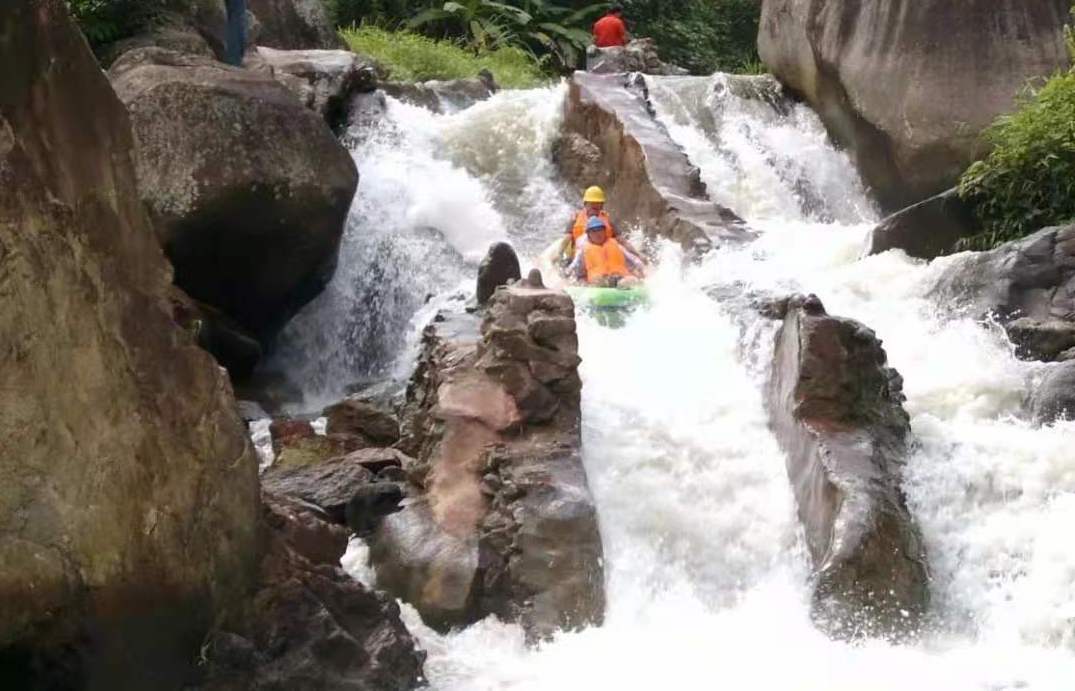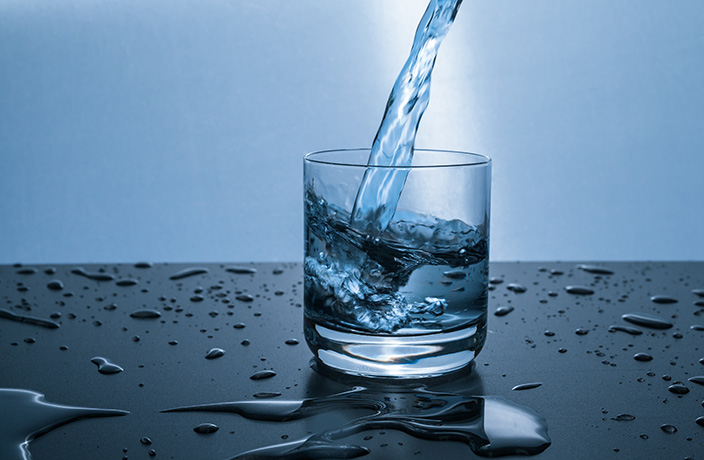My conversation with John Zhu is peppered with terms that I abandoned back in high school chemistry class: calcium, magnesium and sodium, total dissolved solids, minerality and pH levels.
Test tubes, beakers and Bunsen burners, however, are nowhere to be found. Instead, Zhu and I are sitting at a dining table with a white tablecloth, expensive silverware and place settings, as lush jazz music plays in the background at the Park Hyatt Shanghai’s Dining Room restaurant, 87 floors above ground. And, Zhu isn’t a science teacher. He’s one of a few certified master water sommeliers in China, and tasting water from around the world is his full-time job.
The Australian-Chinese sommelier, who has been involved in luxury water for almost a decade, is also the founder and CEO of Purelogica, an importer and distributor for luxury water brands in the Greater China region. Besides Park Hyatt Shanghai, several other luxury hotels such as the Aman Summer Palace, Ritz-Carlton Beijing, St Regis Tianjin and Waldorf Astoria Shanghai on the Bund are also using its luxury water collection with bottles from Norway, Greenland, Slovenia, Canada, Chile and the UK.

Water sommelier is a relatively rare profession; there are just a few countries around the world that offer professional training programs to learn the trade. Zhu, who received his certification from the Korean International Sommelier Association (KISA), established the Purelogica Academy in 2016. Designed in conjunction with KISA, this program provides water knowledge and practical training for frontline staff in some of the country’s most luxurious hotel restaurants. In the last year alone, 69 students in China have received the entry-level water sommelier certificate.
Zhu explains, “[Being a] water sommelier isn’t just about water; it’s about how well you can use water, and your fundamental knowledge about water, and applying it to making tea and coffee, as well as wine and food pairing. This is the job of a water sommelier.”
Water Economics
In front of us are five bottles of luxury water that Zhu supplies to the hotel, and the prices range from RMB118-385 per bottle. “The most expensive bottle in our portfolio is actually the Iluliaq ‘iceberg water’ from Greenland; it’s RMB1,500 a bottle,” Zhu explains.
“The water is hand-harvested by locals who travel by fishing boats to glaciers where they would collect small chunks of ice that have fallen into the ocean. Upon return, they’d shave off the surface, allow the ice to melt in room temperature and collect the water. These icebergs have been around since the Ice Age and have never melted until now, so you’re actually tasting water from 100,000 years ago.”

According to Zhu, while mass-market high-end water brands such as Fiji, San Pellegrino and Evian extract their water from natural sources, they also have facilities equipped with packaging and filtration systems to ensure the chemical, mineral, and bacteria level stay consistent in each bottle. Though this filtration process makes the water much safer to drink, it also affects the natural taste of the water to a certain extent, whereas many bottles in the Purelogica collection are bottled at the source. This sheds light on one of the most common questions that water sommeliers around the world get asked: “What makes luxury water so expensive?”
"The most expensive bottle is the ‘iceberg water’ from Greenland; it’s RMB1,500 a bottle...you’re actually tasting water from 100,000 years ago"
The answer is simple, according to Zhu. “It’s because of the production volume. Every year, these producers only bottle a small quantity to minimize damage to the source’s natural habitat. As a result, we cannot achieve economies of scale like mass-market commercial brands. Also, these places are isolated from human activity, and that leads to expensive logistical costs.” Adding to the equation, the water brands in Zhu’s collection are packaged in bottles created by award-winning design firms and are specially produced by an Austrian manufacturer.
A recent report by EMKT.com.cn (a Shenzhen-based market research firm affiliated with McKinsey) states that the sales for premium bottled water (including domestic and imported brands) in China hovers at around RMB10 billion per year as of early 2017, and this, according to Zhu, is only a small fraction of the global market.
If you look at the general bottled water market, China has for the past few years surpassed the US as the world’s largest consumer by volume, increasing from 19 billion liters to 37 billion liters between 2010 and 2015, according to consultancy firm Zenith.
 Zhu is optimistic about growth potential within the luxury segment of the market, citing Nongfu Spring’s newly launched high-end product line to illustrate his point. He notes, “It shows that there’s a demand for higher quality water among Chinese consumers.”
Zhu is optimistic about growth potential within the luxury segment of the market, citing Nongfu Spring’s newly launched high-end product line to illustrate his point. He notes, “It shows that there’s a demand for higher quality water among Chinese consumers.”
Days after our meeting with Zhu, Coca-Cola introduced Valser, a premium Swiss sparkling water label, on e-commerce platform Tmall. At the time of writing, two 750ml bottles cost a whopping RMB98. It looks like commercial giants share Zhu’s confidence in the market, but can consumers taste the difference?
H2O Tasting 101
Water sommeliers meet skepticism about their line of profession all the time, and some even say the job is a marketing gimmick. “People always ask me, ‘Doesn’t all water taste the same?’” A short version of his answer to this question is ‘no,’ and Zhu says he usually conducts a water tasting session to prove his point. “It’s pure geology,” he adds.
Much like wine and coffee, the taste of the water is affected by the origin of its source and the surrounding geological formation. This is an integral part of a water sommelier’s basic knowledge. Water from Western and Central Europe is high in minerals, while those extracted from Latin America, South America, Asia, Australia and New Zealand have relatively low minerality as the rock formations are much more solid and the chemical elements don’t dissolve easily into the water.
 “Basically, if the level of total dissolved solids (TDS, a measurement of minerality in water) is low, the water is very crisp and pure. As the TDS level rises, minerals add taste and character to the water,” Zhu explains, while opening a bottle labeled ROI. It’s a rare naturally carbonated water from Slovenia, a country known for its thermal spas with water containing high levels of magnesium and calcium – an all-natural muscle relaxer.
“Basically, if the level of total dissolved solids (TDS, a measurement of minerality in water) is low, the water is very crisp and pure. As the TDS level rises, minerals add taste and character to the water,” Zhu explains, while opening a bottle labeled ROI. It’s a rare naturally carbonated water from Slovenia, a country known for its thermal spas with water containing high levels of magnesium and calcium – an all-natural muscle relaxer.
Surprisingly, the water comes with a sharp, almost citrusy flavor that resembles an unsweetened version of a classic preserved lemon and 7-Up drink popular in Hong Kong diners. What I’m tasting, according to Zhu, is magnesium. “If the water contains high levels of magnesium, it has a metallic taste,” Zhu tells me as I try to decipher that oddly familiar flavor. “It actually goes quite well with freshly shucked oysters.”
With its pH level of 6.7, when you mix this Slovenian magnesium-rich water with the seawater in the oysters (where the pH level is as high as 11 or 12), it actually neutralizes the saltiness and bitterness and makes the oyster sweeter. “In fine dining, the aim is to achieve a balance in flavor. Water can be used as a ‘counterbalance agent,’ according to their TDS levels and chemical compounds.”
When water is rich in calcium – such as those produced under the Elsenham label
from a confined chalk aquifer in the UK – it has a slightly sweet taste and a thicker ‘texture’ that is best paired with savory items like cured meat and roast pork. “It’s almost like milk that has been filtered multiple times,” Zhu explains while I take a sip. I can’t detect the sweetness, though the creamy mouth-feel is immediately noticeable.
For desserts made with dark chocolate, a pairing with high-sodium water such as the Canadian gold-filtered mineral water, Gize, can bring hidden sweetness to the surface. When compared with Elsenham, Gize is much lighter in texture and a touch saltier too.
The level of carbonation also has to be taken into consideration when you pair water with wine. “We don’t want to have bubbles that are ‘too big’ or ‘too loud’ because they can numb your palate. Smaller bubbles can stimulate your taste buds and make them more sensitive for the next wine or dish.”

While every sommelier around the world has his or her own way to conduct a tasting, he tells me that the compare and contrast method he uses is usually the standard approach. “What’s your favorite?” he asks. I’m surprised at how quickly I’m able to choose one – the Slovenian bottle, mainly because of its distinct flavor. Perhaps, the gimmicky façade is a way for water sommeliers like Zhu to show people how interesting water is.
Drink Responsibly
Raising awareness about the importance of protecting water sources is something that Zhu also hopes to achieve with his Purelogica Academy. He sees his collection of luxury water as an important tool to educate not just the folks within the F&B industry, but also the general public, about the issue.
“I want people to have the fundamental understanding that waters from different places DO taste differently… Water is a precious commodity and we shouldn’t waste it. One day, clean drinking water will become very expensive as sources dwindle down.”
Visit www.purelogica.com to learn more about its luxury water collection.





















0 User Comments